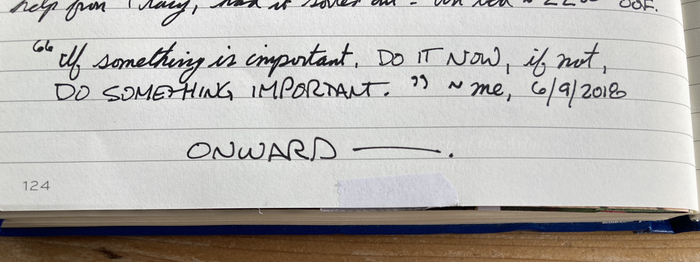No man’s body is as strong as his appetites.
~ Tillotson
slip:4a1551.
No man’s body is as strong as his appetites.
~ Tillotson
slip:4a1551.
What did I do to lose 60 lbs? […] Based on all that, I am pretty much convinced that the main factors were the following:
~ Ned Kock from, My transformation: I cannot remember the last time I had a fever
slip:4ubomy1.
Over the years on this blog, I’ve linked to a bunch of things from Health Correlator. This—like everything—is well worth the read.
ɕ
In this modern age, very little remains that is real. Night has been banished, so have the cold, the wind and the stars. They have all been neutralized: The rhythm of life itself is obscured. Everything goes so fast and makes so much noise, and men hurry by without heeding the grass by the roadside, its colour, its smell and the way it shimmers when the wind caresses it. What a strange encounter then is that between man and the high places of his planet!
~ Gaston Rébuffat
slip:4a1550.
In one tiny town, more than a dozen people were diagnosed with the rare neurodegenerative disease ALS. Why?
~ Shayla Love, from Was a Mushroom Behind an ALS Outbreak in the Alps?
slip:4utehe6.
Which looks exactly like a click-bait headline—but it is not. I started reading this article and couldn’t stop. ALS is not caused by mushrooms… except perhaps in these cases it was?
ɕ
Persevere in what you have begun; hurry as much as you can, so that you will have more time to enjoy a mind that is settled and made flawless. To be sure, you will have enjoyment even as you make it so; But there is quite another pleasure to be gained from the contemplation of an intellect that is spotlessly pure and right.
~ Seneca
slip:4a1549.
So, here’s something of a little manifesto or rallying cry:
- If you only spend your time on Facebook/Twitter/Medium then stream in, stream out – you’re going to get what you ask for. A fleeting set of stories loosely bound.
- So, spend time in the corners of the web. Subscribe to some newsletters. Bookmark some forums and blogs in your browser and show up regularly. It’s hard, there’s no stream. But you’ll start to find the mom & pop internet not the shopping mall internet.
- Dabble with your own space. Dabble with your own voice. Own your own platform.
- But don’t stop there – own your own distribution too! Build a newsletter. Build a messenger bot to alert people to new posts. Build your own stream. Create a shared delusion of showing up regularly.
Long live the indie web.
~ Tom Critchlow, from Indie Blogging & Distribution
slip:4utoii1.
I was a frequent user of the Internet before the web. Today is vastly better than then. The web straight up kicks ass, and the web is not just alive and well, it’s flourishing. If you aren’t seeing great content, you simply haven’t yet figured out where to look for it. Go look. (Right after you go read the above, of course.)
ɕ
The one way to guarantee we don’t benefit from failure—to ensure it is a bad things—is to not learn from it. To continue to try the same things over and over (which is the definition of insanity for a reason). People fail in small ways all the time. But they don’t learn. They don’t listen. They don’t see the problems that failure exposes. It doesn’t make them better.
~ Ryan Holiday
slip:4a1548.
In this article, I wanted to share some of the many lessons I’ve learned from George over the years and in the process of working on the book with him. His wisdom and example have influenced my life in ways I never could have imagined—I hope these 21 lessons impact you as much as they have impacted me…
~ Ryan Holiday, from 21 Powerful Life Lessons From My Mentor (George Raveling)
slip:4urypo1.
I’m not even quoting a single one, because you should go read them all.
ɕ
The race convinced me of what I had for some time suspected. For me, the ideal life is one that combines body and spirit, one that joins the intensely physical and the intensely intellectual. I would wither away without the exercise of the flesh.
~ Barry Strauss
slip:4a1547.
On a personal level, I have found that keeping reminders of mortality close at hand provides me with the clarity to see what truly matters to me, and the courage necessary to live a life aligned with my values. Because I have, for decades, been asking myself what I would regret if I were to die – and because I made changes in accord with those answers – I live a rich and fulfilling life that I appreciate every day.
~ Joanna Ebenstein from, Reflections on mortality can help you live well now – here’s how
slip:4upygu15.
Hear! Hear! And I’ll keep talking and writing about memento mori.
ɕ
Passion makes us feel, but never see clearly.
~ Bulwer-Lytton
slip:4a1546.
Adapted from a series of Instagram posts by Weiss, the film blends reenactments, live action and, of course, some exquisite microscopy to explore how his tendency to seek ‘comfort in unusual places’ culminated in his spending up to 16 hours at a time with only single-celled organisms as company.
~ from, A body called life
Watch.
ɕ
Ritual is not the re-enactment of a past event. It is the re-enactment of meaning.
~ David Whyte
slip:4a1545.
He smiled a little. He looked forward, thinking, perhaps about the movie, as if it hadn’t crossed his mind for a long time. Then he grinned and said: “Money job.”
~ Ben Stiller from, Gene Hackman’s Simple Truth
It’s not clear, of course, exactly how Hackman meant for Stiller to take his simply reply. But, having seen The Poseidon Adventure, I’m taking it this way: Hackman is a consummate professional, able to deliver. “You need what done? I can do that.” That’s a professional.
ɕ
[Do not disquiet] yourself by running about from place to place. Thrashing around in that way indicates a mind in poor health. In my view, the first sign of a settled mind is that it can stay in one place and spend time with itself.
~ Seneca
slip:4a1544.

What’s the habit that’s give me the most benefit? I’m not certain if it’s journaling or meditation. I have a habit of reviewing previous-years’ journal entries each morning. Reading the one-year-ago entry is enlightening. Reading the 10-years-ago entry often induces vertigo; who was that person?
ɕ
Consider this mindset:
never in a hurry
never worried
never desperate
never stopping shortAs Epictetus once summarized his entire philosophy: Persist and resist. Persist in your efforts. Resist giving in to distraction, discouragement, or disorder.
~ Ryan Holiday
slip:4a1543.

This is just one of countless times I’ve strolled this connector-trail. It’s different every time. This time, I was literally arrested mid-stride to snap this.
ɕ
A man’s job is to make the world a better place to live in, so far as he is able—always remembering the results will be infinitesimal—and to attend to his own soul.
~ Leroy Percy
slip:4a1539
How does a podcast serving millions still make each listener feel personally connected?
Discover why “connection, not perfection” became the north star for one of the world’s most-listened-to language shows.
[Do you ever freak-out thinking about 200,000 people listening?] I think that our vision of the human connection is still so strong inside me, that I think about that. I think about that listener who might feel isolated right now because of language. They’re either living in the US and they’re struggling to get connected in their community, or they’re on a call from Japan to New York and they’re cringing because they think they just said the wrong thing and they’re not building the business relationship.
~ Lindsay McMahon (19:00)
This conversation with Lindsay McMahon explores the strategic structure and guiding values behind one of the most successful podcasts for English language learners. Lindsay discusses how the show’s consistency in structure, length, and tone builds trust and supports learning. The format was intentionally designed from the beginning, and every episode follows a clear template. The recurring message, “connection, not perfection,” drives the brand and resonates deeply with listeners around the world. The show targets global English learners, particularly professionals, and publishes five days a week, delivering a sense of reliability and approachability.
Lindsay shares her team-building strategy, including how co-hosts are hired, trained, and retained. She emphasizes treating podcasting as a business (for example, offering benefits like 401(k) matching), which contributes to long-term team cohesion. The show’s monetization model is also discussed, covering courses, sponsorships, licensing, and Apple+ subscriptions. The team uses lead magnets (like quizzes), and consistent calls to action are embedded in every episode. Additional topics include burnout, managing production buffers, and ambitions to expand into live events and podcast coaching.
Takeaways
Designing a consistent episode format — A deliberate structure supports language learning and creates a predictable listener experience.
“Connection, not perfection” as a guiding principle — Prioritizing human connection over grammatical precision challenges traditional language instruction.
Podcasting as a business, not a hobby — Hiring co-hosts as paid team members ensures accountability and long-term consistency.
Lead magnets drive engagement — Quizzes are particularly effective at converting listeners into email subscribers.
Outlining instead of scripting — Episodes are outlined with teaching goals but intentionally unscripted to maintain spontaneity.
Batch recording and long buffers — Maintaining a three-week content buffer ensures uninterrupted delivery despite emergencies.
Burnout isn’t hypothetical — High-stress periods, like losing a team member, can lead to physical consequences and force reevaluation.
Team chemistry matters — Rapport between co-hosts is essential and carefully considered during hiring.
Being contrarian creates distinction — Challenging industry norms, like overemphasis on perfection, helps define a unique brand identity.
Listener-first thinking — Constant attention is paid to whether the listener is engaged and whether the show is truly serving their needs.
Video is a distribution channel, not a core product — Repurposing podcast audio for YouTube helps reach wider audiences without diluting focus.
Podcasting isn’t the business — The podcast functions as the top of a funnel for a multifaceted language education company.
Seasons don’t make sense for some formats — A continuous delivery model supports learners’ expectations and needs.
In-person events are powerful but resource-heavy — Listener meetups provide deep engagement but require significant logistics.
Launching early provided advantage — Entering the English-as-second-language podcast market in 2013 gave a head start with less competition.
Resources
All Ears English — Main site for the language-learning podcast and its related offerings.
All Ears English YouTube Channel — Video recordings of podcast episodes for additional reach.
Apple Podcasts: All Ears English — To listen, but also if you want to see what they’re doing with Apple+ subscriptions and how that shows up in the Apple player.
Business English from All Ears English — One of the brand’s additional podcasts focused on business-specific English learning.
IELTS Energy Podcast — Show for students preparing for the IELTS exam, also under the All Ears English brand.
OptinMonster — Tool mentioned for generating email opt-ins from website traffic.
Podcast Movement — Mentioned as the location (at the 2024 event in London) of recent discussions on the future of video in podcasting.
(Written with help from Chat-GPT.)
ɕ